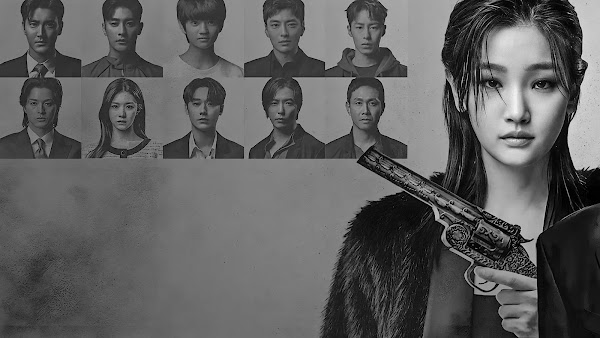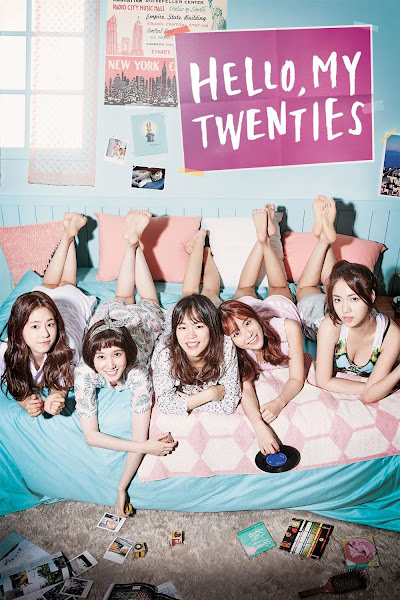Search This Blog
Welcome to my blog, where we explore the rich tapestry of Korean content on OTT—from deeply moving dramas to captivating films—all while diving into the broader landscape of Korean culture. Whether you’re a seasoned K-drama fan or a newcomer eager to discover the cinematic gems, this is your space to find heartfelt reviews, thoughtful insights. Get ready to embark on a journey that celebrates the stories, characters, and traditions that make Korean entertainment so universally compelling!
Featured
Death’s Game is a bold and emotionally charged Korean drama where a man must live through multiple deaths to discover the meaning of life.
Fates Rewritten: Why ‘Death’s Game’ Is a Must-Watch Korean Drama
Introduction
What if your punishment after death wasn’t eternal darkness—but reliving multiple lives and deaths over and over again? Death’s Game takes this unsettling concept and transforms it into one of the most thrilling and emotionally complex K-dramas in recent memory. With philosophical depth, visceral storytelling, and a star-studded cast, this 2023 fantasy-thriller on TVING (and Prime Video globally) turns mortality into a dramatic odyssey where every breath counts—and every choice echoes.
Overview
Title: Death’s Game
Year: 2023–2024
Genre: Fantasy, Thriller, Psychological Drama
Main Cast: Seo In-guk, Park So-dam, Go Youn-jung, Kim Ji-hoon, Lee Jae-wook, Jang Seung-jo, Oh Jung-se, Kim Kang-hoon, Choi Si-won, Sung Hoon, Kim Jae-wook, Lee Do-hyun (special appearance)
Number of Episodes: 8 (Part 1) + 8 (Part 2)
Running Time: Approx. 50–65 minutes per episode
Available On: TVING (Korea), Amazon Prime Video (global)
Overall Story
Choi Yi-jae (Seo In-guk) is a man at the end of his rope. After enduring years of misfortune, rejection, and a devastating betrayal that derails his last hope at employment, he decides to end his life. But his death is just the beginning. Instead of finding peace, he meets Death herself—embodied by a calm yet cold figure played by Park So-dam—who condemns him to a twisted punishment: he will now be reborn twelve times, each time in a new person’s body, only to die again and again. His sentence will end only if he can find a reason to live.
Each reincarnation plunges Yi-jae into a different life—sometimes as a rich heir, a prisoner, a laborer, or a student. But every life comes with its own struggles and tragedies, forcing him to confront pain, love, injustice, and occasionally, hope. He retains his consciousness through each identity, forced to navigate the consequences of choices made by others and reflect on how fleeting and precious life can be when viewed from so many angles.
What starts as a story of existential punishment quickly evolves into a layered exploration of human morality and social inequality. Yi-jae begins his journey indifferent to others’ pain, but over time, the people he meets—both cruel and kind—shift his worldview. His internal evolution becomes the true center of the drama. It’s not just about surviving his deaths; it’s about understanding why life matters in the first place.
Death (Park So-dam), originally presented as a detached judge of souls, begins to observe Yi-jae’s emotional growth with subtle curiosity. Their dynamic becomes more than just punishment and penance—it becomes a reflection of humanity’s complexity and capacity for change. Park’s portrayal adds a poetic stillness to the series, often challenging Yi-jae with philosophical questions rather than threats.
The emotional weight of each episode lies in how Yi-jae connects with the people around him. In one body, he experiences the anguish of bullying and family breakdown. In another, he tastes the sweet brevity of love. Some lives are cut short by systemic injustice, others by personal despair. Yet, no matter how brief or tragic, each life leaves a mark on him. These aren’t just deaths—they are lessons in empathy.
Through increasingly high-stakes lives—including one involving political corruption and another tied to a serial killer—Yi-jae is not only trying to survive but also attempting to protect others and seek redemption. As the countdown of deaths ticks away, he starts to ask not “Why me?” but “What can I do with the time I have left?” The drama’s pace intensifies, but never at the expense of the soul it carefully nurtures from the beginning.
Highlight Moments
The first major turning point arrives in Episode 2, when Yi-jae wakes up in the body of a high school student named Kim Kang-woo. After experiencing vicious bullying and a horrifying moment on the rooftop, he manages to save someone else even while dying again himself. It’s the first time we see Yi-jae challenge the fate that Death handed him—and it stuns her.
Episode 4 features Yi-jae inhabiting the body of a young firefighter. As flames rage around him, he chooses to save a trapped child rather than himself, knowing he will die. The sequence is both cinematically intense and emotionally devastating. For the first time, Yi-jae feels pride in death.
A pivotal scene in Episode 6 shows Yi-jae as a convicted criminal trying to prove his innocence. During a brutal interrogation scene, Seo In-guk delivers one of his finest performances, showing Yi-jae’s breaking point—and his stubborn resolve to endure, not just survive. It’s a moment of identity dislocation that mirrors the drama’s central theme.
In Episode 9 (Part 2), Yi-jae inhabits the body of a corrupt politician. Surrounded by power and privilege, he uncovers a child trafficking scandal. Rather than abuse the power at hand, he turns into a whistleblower, knowing it will cost him his life. The moral clarity of the decision cements how far he’s come.
The final transformation before his last life is revealed in Episode 15. As Yi-jae realizes whose body he’s inhabiting, he stares into the mirror, not at a stranger—but at someone who wronged him in his original life. The silence in this scene speaks louder than any words, and Seo In-guk’s haunted expression leaves an unforgettable impression.
Memorable Lines
In Episode 1, as Death first condemns Yi-jae, she says with chilling calm: “You chose to throw your life away. Now, you’ll learn what life truly means—through death.” This line sets the philosophical tone of the series and foreshadows Yi-jae’s grueling journey ahead.
Episode 3 finds Yi-jae whispering to a crying child he just saved: “Even if this body dies, the choice to save you was mine.” It’s a quiet but monumental moment showing how he’s starting to value life—not just his own, but others'.
In Episode 6, when Yi-jae confronts Death after another painful demise, he screams: “If you wanted me to regret living, you chose the wrong person.” It’s a raw expression of defiance that marks his shift from victim to active agent.
Episode 10 has one of the most touching moments, when Yi-jae tells a dying lover: “I don’t know how long I’ll be here, but loving you made this life worth everything.” This fleeting romance becomes one of the most beloved arcs in the drama.
Near the finale, Death looks at Yi-jae and murmurs, “You’ve changed. But was it because of life—or because of death?” The line captures the central tension of the show and leaves viewers pondering their own perspective on existence.
Why It’s Special
Death’s Game stands out as one of the boldest narrative experiments in recent K-drama history. Its high-concept premise—death as a vehicle for redemption and self-discovery—is not only compelling but philosophically rich. Instead of treating reincarnation as fantasy fluff, the show uses it to dissect moral responsibility, the fragility of human experience, and what it means to truly live. It’s a story that dares to ask: if given multiple chances, would you become better—or just survive longer?
The drama’s use of multiple high-profile actors playing versions of Choi Yi-jae in each reincarnation is not just a casting gimmick—it’s a masterstroke. By allowing each actor to interpret Yi-jae through different bodies, social roles, and emotional registers, the show invites viewers to witness human complexity across class, gender, and circumstance. It also gives each life its own tonal flavor, ranging from noir thriller to high-stakes courtroom drama to tearful melodrama.
Seo In-guk anchors the series with his unwavering emotional core. His performance stitches together the disparate narratives with a consistent sense of desperation, growth, and gradual transformation. His expressions alone—hardened by failure, softened by fleeting joys—communicate more than entire monologues could. Without his grounding presence, the show’s shifting format might have felt disjointed; instead, it feels like an emotional continuum.
Park So-dam’s Death is another highlight. Her restrained performance avoids the clichés of either sadistic villain or merciful guardian. Instead, she plays Death as a quiet observer—almost poetic in her detachment—whose gaze forces both Yi-jae and the viewer to contemplate their own moral compass. Her evolving reactions subtly mirror the audience’s own shifting sympathy for Yi-jae.
Cinematically, Death’s Game is sleek and immersive. The color grading changes with each life, reflecting mood and theme. Action sequences are tightly choreographed, especially in the firefighter and assassin arcs. The soundtrack, particularly the haunting piano motif that follows Yi-jae’s more tragic deaths, adds a layer of emotional continuity across timelines.
Above all, the series is special because it refuses to offer easy answers. Every death Yi-jae experiences isn’t just another story—it’s another lesson in what people value, what they fear, and what they’re willing to fight for. It reminds us that the weight of a single choice can span lifetimes—and that perhaps, life’s meaning lies in our willingness to face even its harshest chapters with open eyes and an open heart.
Popularity & Reception
Death’s Game made a major impact even before its release due to its star-studded ensemble and philosophical premise. Upon its premiere, the show quickly trended across Korean and international platforms, with hashtags like #DeathsGame and #SeoInGuk topping X (formerly Twitter) trends in multiple regions. Fans praised the drama not just for its action or suspense, but for its emotional depth and intellectual weight.
Critics lauded the drama’s ambitious structure. Korean outlets such as Sports Chosun and Herald Pop called it “genre-bending” and “shockingly heartfelt,” while Western platforms like Soompi and The Fangirl Verdict highlighted its rewatch value and multilayered storytelling. International fans, especially on Reddit and TikTok, shared theories about the order of deaths and potential meanings behind the reincarnated lives.
The show’s unique casting choices were widely discussed. Having major actors like Lee Jae-wook, Kim Jae-wook, and Lee Do-hyun appear for just one or two episodes turned each installment into an event. These short appearances were treated like mini-films, and many praised the way each actor brought a new flavor to Yi-jae’s inner conflict.
TVING reported record streaming numbers for both Part 1 and Part 2, with a significant spike in new subscriptions from younger demographics. On Amazon Prime Video, the series trended in over 10 countries, including the U.S., Canada, Thailand, and the Philippines. Fans even started fan edits that matched each version of Yi-jae with different philosophical quotes.
Long after its finale, Death’s Game continues to provoke discussion about life, justice, and fate. Online forums remain active with debates about which of Yi-jae’s lives was the most impactful—and whether Death’s judgment was truly fair. The show’s ability to balance spectacle with introspection has solidified it as one of 2023–24’s most memorable K-dramas.
Cast & Fun Facts
Seo In-guk (Choi Yi-jae) delivers a deeply resonant performance that anchors the entire narrative, even though his screen time is occasionally shared with other actors portraying Yi-jae's physical form. Known for emotionally charged roles in Reply 1997, Doom at Your Service, and The Smile Has Left Your Eyes, Seo transforms here into a man who is not only broken but actively reshaping himself. He reportedly journaled in-character during filming to understand Yi-jae’s evolving psychology.
Seo’s portrayal spans grief, fury, guilt, and ultimately acceptance—showcasing his remarkable range. In behind-the-scenes interviews, he shared that filming the death sequences was emotionally exhausting but rewarding. He particularly highlighted the Episode 6 arc, where he had to channel desperation and strength simultaneously in a prison setting.
Park So-dam (Death) adds a haunting elegance to the role of a supernatural judge. Best known for her role in Bong Joon-ho’s Oscar-winning Parasite, Park brings nuance to what could have been a flat antagonist. She studied Eastern and Western depictions of death—gods, angels, and personifications alike—to create a character that felt timeless yet eerily familiar. Her choice to keep Death emotionally restrained added powerful contrast to Yi-jae’s turbulent journey.
The casting structure of Death’s Game was unprecedented in Korean drama history. Major stars like Kim Ji-hoon, Lee Jae-wook, Choi Si-won, and Kim Jae-wook each portrayed one of Yi-jae’s incarnations. Every actor approached their role with unique methods—Choi Si-won reportedly improvised parts of his dialogue to better capture his character’s chaotic spirit, while Kim Ji-hoon worked with a dialect coach for a specific regional cadence in his arc.
Go Youn-jung, who plays one of the key supporting characters intertwined with multiple lives, brought emotional depth to her role. Known from Alchemy of Souls and Sweet Home, her performance in this series highlighted her ability to portray subtle resilience and heartbreak across different timelines. Her scenes with Yi-jae form some of the drama’s most bittersweet moments.
The production team filmed the drama across multiple locations in Korea, with each episode styled differently to reflect the character’s socioeconomic background and thematic tone. Director Ha Byung-hoon, who previously worked on 18 Again, revealed that shooting out of sequence with multiple leads required near-military-level planning. He credited his team’s adaptability and Seo In-guk’s emotional consistency for making the series cohesive.
The OST, featuring artists like Gaho and Younha, became a chart-topper. Gaho’s track “To Die Again” was particularly well-received, with fans praising its lyrical connection to Yi-jae’s psychological spiral. The music was composed to subtly evolve in tone with each episode, mirroring Yi-jae’s internal growth.
A lesser-known fact is that the drama’s concept originated from a popular webtoon of the same name by Lee Won-sik and Gul-chan. The adaptation process involved tightening the number of reincarnations and deepening certain arcs to better suit a serialized television format. Fans of the webtoon praised the adaptation for keeping its philosophical essence while elevating its emotional resonance.
Hashtags
#DeathsGame #SeoInGuk #KoreanDrama #ParkSoDam #TVINGOriginal #KDramaThriller #LifeAndDeath #MustWatchKDrama #FantasyDrama #AmazonPrimeKDrama
Popular Posts
Explore 'Mask Girl,' a gripping Korean drama on Netflix that delves into identity, beauty, and the dark side of internet fame.
- Get link
- X
- Other Apps
'Dear Hongrang', a captivating Korean mystery melodrama set in the Joseon era, exploring themes of identity, family, and forbidden emotions.
- Get link
- X
- Other Apps
'Hello, My Twenties!', a deeply relatable Korean drama that captures the highs and lows of five women navigating love, trauma, and friendship during their college years.
- Get link
- X
- Other Apps
Dive into 'Class of Lies,' a gripping Korean thriller on Netflix that uncovers the dark secrets of an elite high school through the eyes of an undercover lawyer.
- Get link
- X
- Other Apps
Dive into 'Inspector Koo,' a thrilling Korean drama on Netflix where a quirky former cop takes on a serial killer in a deadly cat-and-mouse game.
- Get link
- X
- Other Apps
“Bloodhounds” on Netflix fuses loan shark battles, boxing camaraderie, and moral conviction, exploring how unwavering friendship can challenge a brutal underworld.
- Get link
- X
- Other Apps
Dive into 'Nine Puzzles,' a gripping Korean thriller on Disney+ that unravels a decade-old mystery through intricate storytelling and compelling performances.
- Get link
- X
- Other Apps










Comments
Post a Comment